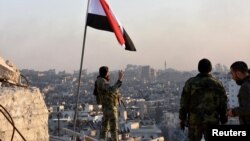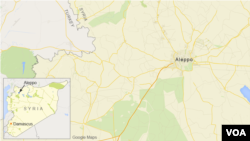Russia pledged Thursday to continue its support of Syrian forces in Aleppo until the city is “cleared of terrorists.”
The comment from Russian Foreign Minister Sergei Lavrov came after a meeting Thursday with his Turkish counterpart Mevlut Cavusoglu, who said the two diplomats agreed on the need to reach a cease-fire in Syria.
Russia and Turkey back different sides in the conflict, with Russia a strong ally of Syrian President Bashar al-Assad and Turkey supporting the rebels who have spent more than five years trying to push him from power.
The Syrian military campaign in Aleppo, which includes Russian airstrikes, has raised international concerns about the safety of civilians in the rebel-held eastern part of the city. Syria has long described opposition fighters there and elsewhere as terrorists.
'One giant graveyard'
U.N. humanitarian chief Stephen O’Brien is calling for states with influence to do everything within their power to protect those civilians and save what was once the country’s largest city from becoming “one giant graveyard.”
O’Brien told an emergency Security Council meeting Wednesday that up to 25,000 people have been displaced from rebel-held districts in eastern Aleppo since Saturday, but that the numbers change “by the hour and day.”
“It is likely that thousands more will flee should fighting further spread and intensify over the coming days,” he told the council via a video link from London.
Beyond Aleppo
While the world’s attention has been focused on more than 250,000 civilians trapped in eastern Aleppo, O’Brien underscored that there are 700,000 more people in other besieged areas across Syria.
“They are trapped, they are petrified; winter is approaching and they are watching the chilling events in Aleppo unfold and asking: Will I be next?” he said.
O’Brien called on the Security Council to overcome its long-held divisions over Syria, to “stop the brutality and also prevent a similar fate befalling other Syrians.”
He said three things are vital: the protection of civilians; safe, unhindered access for aid workers; and an end to sieges.
Political settlement needed
U.N. Syria Envoy Staffan de Mistura, addressing council members from Geneva, estimated that almost 40 percent of the area previously held by armed opposition groups is now in the hands of government forces.
“Make no mistake about this,” he said. “None of the military developments we are witnessing are pointing to what one could call a stable, ongoing, permanent military solution,” he warned.
De Mistura said only a negotiated political settlement will end the crisis.
In an interview with VOA Wednesday, U.S. Ambassador Samantha Power echoed that conclusion.
“They can take a populated area — even one as substantial as eastern Aleppo — inflict horrific human carnage, and the war will not end,” she said. “If anything, we will have more people eager to take up arms against the regime. What will end the war is a political solution.” She said the Obama administration would work until its final day in office to pursue a negotiated peace.
Britain and France called for the emergency meeting. Russia’s U.N. ambassador criticized them for it, saying they were upset because the rebels they support are losing.
“The bandits that they, among others, have so coddled and fueled are on the point of defeat there; almost half of that part of the city has been liberated,” Vitaly Churkin said of the battle for eastern Aleppo. “It could be the biggest, including a moral victory, for the Syrian army since 2012,” he added.
Aleppo, one of the oldest continuously inhabited cities in the world, has been Syria’s most populous urban area and its commercial capital for centuries. As recently as five years ago, estimates of its population ranged up to 2.5 million people. But since becoming a key battleground in the Syrian civil war in mid-2012, Aleppo has been shattered and decimated.
The U.N.’s de Mistura is expected to update the Security Council on Syrian developments again December 8, and said he would give details then on what options may exist for the political process.
On Tuesday, at a meeting of European Parliament, the veteran diplomat said he could not say “how long eastern Aleppo will last,” following the latest government military escalation.
According to the Syrian Observatory for Human Rights, almost 300 civilians, including 33 children, have been killed in eastern Aleppo since the government stepped up its offensive against parts of the city in November.
A leading Syrian opposition group, the National Coalition, asked the United Nations to “take immediate, definitive steps to protect civilians in Aleppo and stop the barbaric offensive against them.”
Aleppo has been a major focus of Syrian military efforts with the backing of Russian airstrikes, and eastern Aleppo has been under government siege for more than four months. The army began heavily bombarding the city two weeks ago and late Monday took control of a key district.
In Washington, the State Department expressed its “deep outrage” at the latest bombing of Aleppo and said Moscow should be held responsible.
Previous efforts to halt the fighting have brought only short-term agreements and no real progress toward a lasting end to the conflict that began in March 2011.






